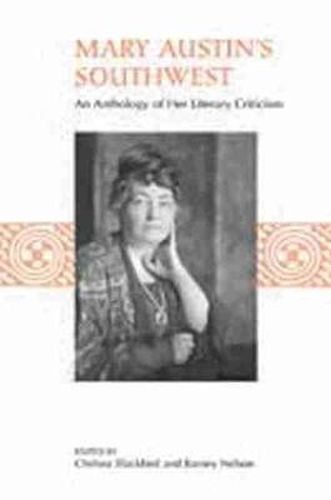Readings Newsletter
Become a Readings Member to make your shopping experience even easier.
Sign in or sign up for free!
You’re not far away from qualifying for FREE standard shipping within Australia
You’ve qualified for FREE standard shipping within Australia
The cart is loading…






If Nationality means anything-and in [the American] case it couldn’t mean race-it must mean the unconscious response of a people to their natural environment. -Mary Austin
Celebrated and controversial author Mary Austin (1866-1934) lived in and wrote about her beloved Southwest, a place that has shaped and been shaped by three distinctive groups: Indian, Spanish, and Anglo. Austin discovered in the Southwest that these cultures blended languages, races, and religions, creating what she believed were unique versions of Catholicism, nature worship, ceremonies, and visions. Those beliefs worked their way through her literary criticism, leading her to ground-breaking ideas of place-based influences, narrative techniques, and dramatic development. In Mary Austin’s Southwest, editors Blackbird and Nelson shine light on Austin’s work, revealing her to be a significant trailblazer for literary diversity. With thoughtful introductions to selected writings on Austin’s prose, drama, and poetry as well as an annotated checklist of her published Southwestern literary criticism, this collection is a celebration of a rich mixed heritage as expressed through the written word.
$9.00 standard shipping within Australia
FREE standard shipping within Australia for orders over $100.00
Express & International shipping calculated at checkout
If Nationality means anything-and in [the American] case it couldn’t mean race-it must mean the unconscious response of a people to their natural environment. -Mary Austin
Celebrated and controversial author Mary Austin (1866-1934) lived in and wrote about her beloved Southwest, a place that has shaped and been shaped by three distinctive groups: Indian, Spanish, and Anglo. Austin discovered in the Southwest that these cultures blended languages, races, and religions, creating what she believed were unique versions of Catholicism, nature worship, ceremonies, and visions. Those beliefs worked their way through her literary criticism, leading her to ground-breaking ideas of place-based influences, narrative techniques, and dramatic development. In Mary Austin’s Southwest, editors Blackbird and Nelson shine light on Austin’s work, revealing her to be a significant trailblazer for literary diversity. With thoughtful introductions to selected writings on Austin’s prose, drama, and poetry as well as an annotated checklist of her published Southwestern literary criticism, this collection is a celebration of a rich mixed heritage as expressed through the written word.